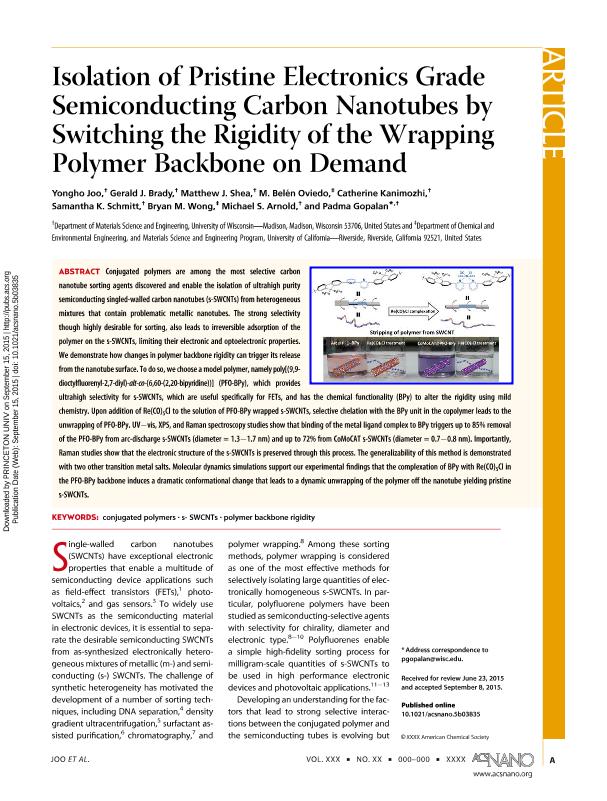Mostrar el registro sencillo del ítem
dc.contributor.author
Joo, Yongho
dc.contributor.author
Brady, Gerald J.
dc.contributor.author
Shea, Matthew J.
dc.contributor.author
Oviedo, María Belén

dc.contributor.author
Kanimozhi, Catherine
dc.contributor.author
Schmitt, Samantha K.
dc.contributor.author
Wong, Bryan M.
dc.contributor.author
Arnold, Michael S.
dc.contributor.author
Gopalan, Padma
dc.date.available
2019-02-28T15:39:37Z
dc.date.issued
2015-09
dc.identifier.citation
Joo, Yongho; Brady, Gerald J.; Shea, Matthew J.; Oviedo, María Belén; Kanimozhi, Catherine; et al.; Isolation of pristine electronics grade semiconducting carbon nanotubes by switching the rigidity of thewrapping polymer backbone on demand; American Chemical Society; ACS Nano; 9; 10; 9-2015; 10203-10213
dc.identifier.issn
1936-0851
dc.identifier.uri
http://hdl.handle.net/11336/70949
dc.description.abstract
Conjugated polymers are among the most selective carbon nanotube sorting agents discovered and enable the isolation of ultrahigh purity semiconducting singled-walled carbon nanotubes (s-SWCNTs) from heterogeneous mixtures that contain problematic metallic nanotubes. The strong selectivity though highly desirable for sorting, also leads to irreversible adsorption of the polymer on the s-SWCNTs, limiting their electronic and optoelectronic properties. We demonstrate how changes in polymer backbone rigidity can trigger its release from the nanotube surface. To do so, we choose a model polymer, namely poly[(9,9-dioctylfluorenyl-2,7-diyl)-alt-co-(6,60-(2,20-bipyridine))] (PFO-BPy), which provides ultrahigh selectivity for s-SWCNTs, which are useful specifically for FETs, and has the chemical functionality (BPy) to alter the rigidity using mild chemistry. Upon addition of Re(CO)5Cl to the solution of PFO-BPy wrapped s-SWCNTs, selective chelation with the BPy unit in the copolymer leads to the unwrapping of PFO-BPy. UV-vis, XPS, and Raman spectroscopy studies show that binding of the metal ligand complex to BPy triggers up to 85% removal of the PFO-BPy from arc-discharge s-SWCNTs (diameter = 1.3-1.7 nm) and up to 72% from CoMoCAT s-SWCNTs (diameter = 0.7-0.8 nm). Importantly, Raman studies show that the electronic structure of the s-SWCNTs is preserved through this process. The generalizability of this method is demonstrated with two other transition metal salts. Molecular dynamics simulations support our experimental findings that the complexation of BPy with Re(CO)5Cl in the PFO-BPy backbone induces a dramatic conformational change that leads to a dynamic unwrapping of the polymer off the nanotube yielding pristine s-SWCNTs.
dc.format
application/pdf
dc.language.iso
eng
dc.publisher
American Chemical Society

dc.rights
info:eu-repo/semantics/openAccess
dc.rights.uri
https://creativecommons.org/licenses/by-nc-sa/2.5/ar/
dc.subject
Conjugated Polymers
dc.subject
Polymer Backbone Rigidity
dc.subject
S- Swcnts
dc.subject.classification
Otras Ciencias Químicas

dc.subject.classification
Ciencias Químicas

dc.subject.classification
CIENCIAS NATURALES Y EXACTAS

dc.title
Isolation of pristine electronics grade semiconducting carbon nanotubes by switching the rigidity of thewrapping polymer backbone on demand
dc.type
info:eu-repo/semantics/article
dc.type
info:ar-repo/semantics/artículo
dc.type
info:eu-repo/semantics/publishedVersion
dc.date.updated
2019-02-28T12:49:08Z
dc.identifier.eissn
1936-086X
dc.journal.volume
9
dc.journal.number
10
dc.journal.pagination
10203-10213
dc.journal.pais
Estados Unidos

dc.journal.ciudad
Washington
dc.description.fil
Fil: Joo, Yongho. University of Wisconsin; Estados Unidos
dc.description.fil
Fil: Brady, Gerald J.. University of Wisconsin; Estados Unidos
dc.description.fil
Fil: Shea, Matthew J.. University of Wisconsin; Estados Unidos
dc.description.fil
Fil: Oviedo, María Belén. University of California; Estados Unidos. Consejo Nacional de Investigaciones Científicas y Técnicas. Centro Científico Tecnológico Conicet - Córdoba. Instituto de Investigaciones en Físico-química de Córdoba. Universidad Nacional de Córdoba. Facultad de Ciencias Químicas. Instituto de Investigaciones en Físico-química de Córdoba; Argentina
dc.description.fil
Fil: Kanimozhi, Catherine. University of Wisconsin; Estados Unidos
dc.description.fil
Fil: Schmitt, Samantha K.. University of Wisconsin; Estados Unidos
dc.description.fil
Fil: Wong, Bryan M.. University of California; Estados Unidos
dc.description.fil
Fil: Arnold, Michael S.. University of Wisconsin; Estados Unidos
dc.description.fil
Fil: Gopalan, Padma. University of Wisconsin; Estados Unidos
dc.journal.title
ACS Nano

dc.relation.alternativeid
info:eu-repo/semantics/altIdentifier/url/https://pubs.acs.org/doi/10.1021/acsnano.5b03835
dc.relation.alternativeid
info:eu-repo/semantics/altIdentifier/doi/http://dx.doi.org/10.1021/acsnano.5b03835
Archivos asociados
